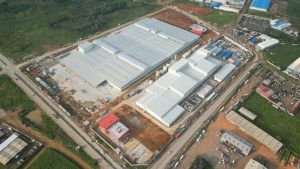Cote d’Ivoire is the world’s largest cocoa producer and exporter, accounting for nearly 40 percent of global production and exports.
In the PK24 industrial park on the outskirts of Abidjan, Cote d’Ivoire’s economic capital, a cocoa processing plant and cocoa bean warehouse are nearing completion.
The project, contracted to China Light Industry Nanning Design Engineering Co., Ltd., is set to become Cote d’Ivoire’s largest domestic cocoa processing facility, boosting the local cocoa industry’s development.
The cocoa sector is a pillar of Cote d’Ivoire’s economy. According to the Coffee-Cocoa Council of Cote d’Ivoire, cocoa exports make up 40 percent of the country’s total export revenue, and 6 to 8 million people in the country work in relevant industries.
However, Cote d’Ivoire’s cocoa industry faces an urgent need to increase product value and achieve industrial upgrading. Statistics showed that in 2019, only 35 percent of Cote d’Ivoire’s cocoa was processed locally. According to the International Cocoa Organization, the global chocolate market is valued at about $100 billion, but only 6 percent of this value reaches cocoa-exporting countries, with a mere 2 percent trickling down to cocoa farmers.
“The Ivorian government’s vision is to process 100 percent of our cocoa beans locally. We hope to increase Cote d’Ivoire’s cocoa processing rate with China’s help. This is crucial for our country,” said Kone Brahima Yves, director general of the Coffee-Cocoa Council of Cote d’Ivoire, in an interview with People’s Daily.
In 2018, President of Cote d’Ivoire Alassane Ouattara attended the Beijing Summit of the Forum on China-Africa Cooperation and paid a state visit to China. During this visit, the leaders of both countries witnessed the signing of bilateral cooperation documents.
In September 2020, a groundbreaking ceremony for the Abidjan cocoa processing plant was held in the PK24 industrial park. At the ceremony, Ouattara stated that the cocoa processing project would contribute to Cote d’Ivoire’s industrialization.
At the PK24 industrial park, a striking picture of a giant cocoa pod adorns the facade of the administrative building built simultaneously with the cocoa processing plant.
In 2019, China Light Industry Nanning Design Engineering Co., Ltd. signed two turnkey contracts with the Coffee-Cocoa Council of Cote d’Ivoire. According to the contracts, the Chinese side would build two new cocoa processing plants, each with an annual capacity of 50,000 tons, in Abidjan and the southwestern coastal city of San-Pedro, along with cocoa bean warehouses capable of storing 140,000 and 160,000 tons respectively. This project is a key collaboration under China-Cote d’Ivoire Belt and Road cooperation.
Tang Chong, project manager of the Abidjan cocoa processing plant, said that the project covers 21 hectares, including a 67,000-square-meter cocoa bean warehouse and an 18,000-square-meter processing workshop. The project uses high-efficiency materials that exceed local environmental standards, ensuring clean disposal of solid waste, wastewater, and exhaust gases.
In the processing workshop, workers were busy installing final equipment. Corneille, an employee from Togo, said in fluent Chinese: “After studying Chinese for over two years at the Confucius Institute of the University of Lome in Togo, I joined the Abidjan cocoa processing plant project. I’ve learned so much here – equipment installation, procurement, translation – I can handle it all now.”
“My mother loves China and Chinese culture. She’s always encouraged me to learn Chinese and visit China,” Corneille told People’s Daily. “I’m very satisfied with my current job. It not only provides me with a stable income but also brings me closer to my dream of going to China.”
It is reported that about 82 percent of Cote d’Ivoire’s cocoa is processed by four global chocolate manufacturers. “Once completed, this project will become Cote d’Ivoire’s largest domestically-owned cocoa processing plant, which is of great significance to the country,” said Tang.
Kone stated that the soon-to-be-completed Abidjan cocoa processing plant is a modern facility at the cutting edge of global standards. “Through this project, our cooperation with Chinese enterprises has reached new heights. We look forward to even closer collaboration with Chinese companies on the San-Pedro project.”
It is learned that 40 percent of the products from the cocoa processing plant will be destined for the Chinese market in the future. Kone noted that China has a vast middle-income population, representing an enormous potential market for cocoa products.
“We’re incredibly excited about introducing our products to the Chinese market. We believe that a continuously developing China will undoubtedly bring more opportunities,” Kone said.













